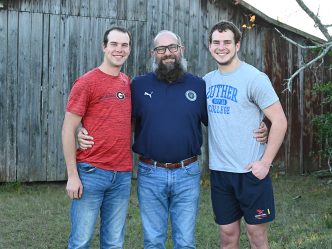When people think about research projects, they might believe it’s pretty straightforward: Find a study of interest, recruit research subjects and eventually come up with results and conclusions
That’s not the case, especially when it comes to research participants.
The Institutional Review Board at Augusta University, as a part of the Human Research Protections Program, ensures all research volunteers are protected by federal regulations.
Human protection regulations date back to the mid 1970’s with the publication of the Belmont Report. The report was developed to identify basic ethical principles for research involving humans after the public learned of the unethical treatment of participants in the infamous syphilis studies known as the Tuskegee Experiment. Those principals, including respect for persons, beneficence and justice, provide the foundation for the federal policy for the protection of human subjects, or the Common Rule.
Ivy Tillman is the IRB director at Augusta University and said earning research subjects’ trust is of the utmost importance.
“It goes back to trust. We get a lot of pushback sometimes. ‘I’m just doing this survey, what’s the big deal?’” said Tillman. “Every encounter an individual has with someone conducting research at Augusta University or from Augusta University, impacts the level of trust that individual has with AU.”
As we move into different times in our culture, we’re dealing with issues of justice and re-examining how justice fits into human research said Tillman.
AU has three internal IRBs: Biomedical board, chaired by Dr. Jose Vazquez, a social behavioral and educational board chaired by Dr. Steven Page, and a biomedical board focused on oncology protocol, chaired by Marjorie Phillips.
The memberships of the IRBs are designed to represent the community and mirror the demographics. Tillman is happy with their boards, but feels there is still room for improvement.
“We’ve done a good job I believe, of having diversity on our committee, but we could do a better job. One area of justice that is new, that a lot of folks haven’t been thinking about is disability. Having individuals on your board who have varying disabilities.”
Before getting a research project in front of the IRB, there are a lot of boxes to check and procedures to be done before reaching out to participants for the study.
“It’s a challenge because IRB submissions are like nothing anyone’s ever done before. It looks different because of the regulations. We’re also an accredited Human Resource Protection Program, and that adds another layer. Every box to check has a meaning, everything that is asked has a meaning and it goes back to protection.”
One principal of justice to be considered is that researchers need to have fair procedures when selecting people for a study. If a study is done on a disease or condition in an underrepresented population, they need to study the populations that are most affected by it.
“It may be a simple survey, but the way you’re describing how you’re going to obtain informed consent, may not honor this particular population well. The main issue is trust and how we can address trust. We address it by No 1, honoring our population, honoring their norms and how they process and make decisions and incorporating that into research. Being accountable and being sustainable. So that’s a whole lot of what we’re doing that fits into that justice model.” added Tillman.
The entire review process is based on federal regulations and standards. One thing researchers may take for granted is the consent documents for participants — those need to make sense, be readable and understandable to all.
Currently the IRB has nearly 1000 active protocols that will be seen by someone within the IRB office.
Tillman said overall, about 75% of them are biomedical with about 20% social behavioral. She calls that exciting.
Recently, the IRB held a retreat that was open to all its members. It gave everyone a chance to look at things in a different light for the good of research.
“The one common goal remains the same: Increase research, increase innovation, but also do it in a way that protects the individuals involved. It protects the integrity of our institution and it protects the life work of our researchers.”
 Augusta University
Augusta University




